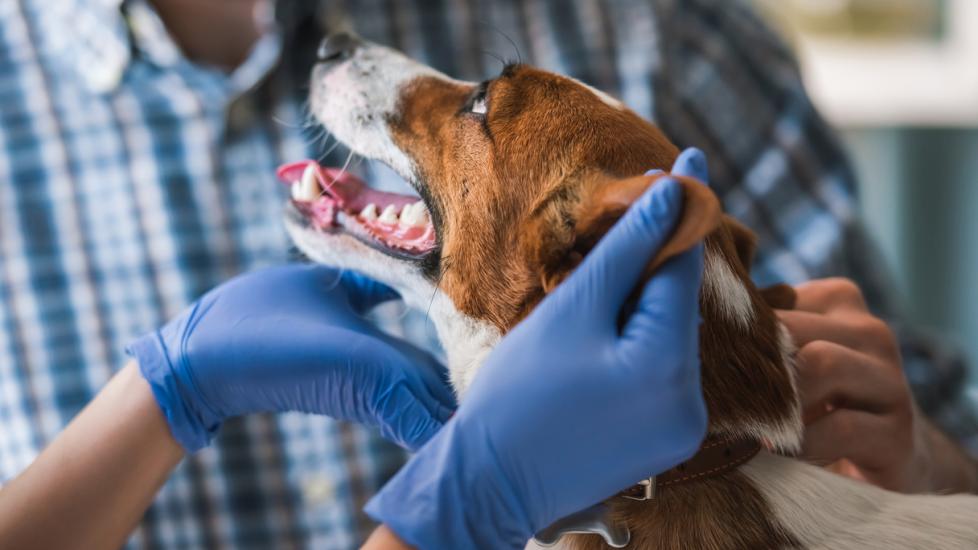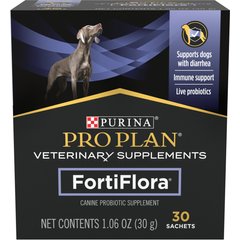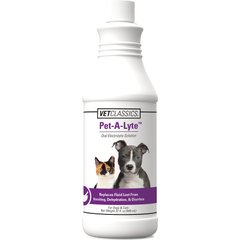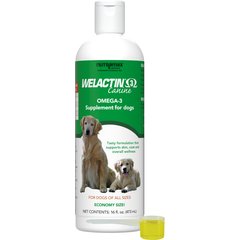Recessed Vulva in Dogs
What Is a Recessed Vulva in Dogs?
A recessed vulva, also referred to as a hooded vulva, is when there is extra skin surrounding and folding over the vulva. This extra skin allows for moisture to be trapped underneath.
Female dogs that have hooded vulvas are more likely to develop vaginal infections (vaginitis) and urinary tract infections. Once bacteria grow within the skin fold of a hooded vulva, they move into the bladder and can cause a urinary tract infection. Yeast infections around the vulva are also more common in dogs that have hooded vulvas.
Vet Recommended Health Support
- Purina Pro Plan Veterinary Diets FortiFlora Powder Probiotic Digestive Supplement for Dogs, 30 count$30.99Chewy Price
- VetClassics Pet-A-Lyte Oral Electrolyte Solution Dog & Cat Supplement, 32-oz bottle$18.53Chewy Price
- Nutramax Welactin Omega-3 Liquid Skin & Coat Supplement for Dogs, 16-fl oz$27.99Chewy Price
- Fera Pets USDA Organic Pumpkin Plus Fiber Support for Dogs & Cats, 90 servings$34.95Chewy Price
Symptoms of Recessed Vulva in Dogs
Some dogs may not have any health issues caused by a recessed or hooded vulva, although this condition can cause chronic vaginitis and recurring urinary tract infections with irritation and pain. Infected skin around the vulva will look moist, red, or black and may have an odor.
When a dog has vaginitis or a urinary tract infection, they may not show symptoms. This makes it difficult to determine that there is a problem. However, most dogs will show symptoms. For instance, if the skin around the vulva is infected, a dog will often lick excessively at the vulva due to itchiness and discomfort caused by the infection. Dogs may also scoot their rear end along the floor to try and “scratch the itch.”
If a dog with a recessed vulva has a urinary tract infection (UTI), the most common symptoms are:
-
Urinating more frequently (polyuria)
-
Drinking more water (polydipsia)
-
Urinary accidents in the house
-
Straining to urinate (squatting more but urine may not always come out)
-
Bloody urine (hematuria)
If there is a skin infection around the vulva, it can be diagnosed during a routine physical exam. To diagnose a urinary tract infection, a urine sample is needed for testing.
Causes of Recessed Vulva in Dogs
A recessed vulva was once thought to be a genetic issue, but the genetic link has not yet been found. Medium to large breeds are more prone to having a recessed vulva, compared to small or toy breeds. Obese dogs are at greatest risk, due to fatty tissue that accumulates around the vulva, causing a fold of skin to fully surround it.
How Veterinarians Diagnose a Recessed Vulva in Dogs
A recessed vulva can be diagnosed during a routine physical exam because the vulva will not be easily visible as it should be. Instead, it will be covered by a fold of skin that will need to be pushed back in order to see it properly. No tests are needed to diagnose it.
A veterinarian may perform a tape impression test if the skin around the vulva appears infected. This test involves taking a small, clear piece of tape and gently applying it to any skin lesions around the vulva. The tape is then removed and stained. It will then be examined under the microscope to see if there are bacteria or yeast present. Topical or oral medication will be prescribed for treatment if a skin infection is diagnosed.
If a dog with a recessed vulva is showing signs of a possible urinary tract infection, a urine sample will be needed for a urinalysis. This test helps diagnose an infection by checking for red and white blood cells, urinary crystals, and bacteria. It also checks kidney function and screens for diabetes.
Treatment For a Recessed Vulva in Dogs
Dogs that have this condition and do not have any associated medical issues will not need treatment—only dogs with a recessed vulva that have vaginitis and/or urinary tract infections. Medicated anti-bacterial or anti-fungal wipes may be prescribed to help keep the skin clean around the vulva on a daily basis to prevent or minimize skin and urinary tract infections.
If obesity is the suspected cause of a recessed vulva, a weight loss plan will be recommended. Weight loss may allow for the vulva to be properly exposed and eliminate a fold of skin covering it up. It is also possible that weight loss may not fully eliminate a recessed vulva, but it may lessen it, so that recurring skin infections and UTIs no longer develop.
Surgery is required for treatment if a dog is a healthy body weight and has a recessed vulva that causes recurring skin and/ or urinary issues.. The surgery, called an episioplasty or vulvoplasty, involves surgical removal of extra skin around the vulva, allowing it to be exposed normally.
If a dog is diagnosed with a recessed vulva and needs to be spayed, then a vulvoplasty can be done at the same time as the spay. If there is a severe skin infection around the vulva prior to surgery, this infection needs to be fully treated before surgery can be performed.
Recovery and Management of a Recessed Vulva in Dogs
Oral medications, consisting of an antibiotic and pain medication, are prescribed after surgery to prevent infection and provide pain relief. A sedative is often prescribed as well to keep the dog calm after surgery. Dogs do recover quickly after a vulvoplasty, and their energy level and appetite are typically back to normal within 24 hours of surgery. However, the incision takes 10-14 days to heal.
Post-surgery, it is important to:
-
Limit the dog’s activity level until the stitches are removed in 10-14 days by a veterinary professional. This means taking the dog on short leash walks only. No running, jumping, or rough play are allowed until the stitches are removed to ensure that the stitches do not pop during recovery.
-
Provide crate rest to limit activity if the dog is crate-trained
-
Use an e-collar (cone) around the dog’s head to prevent licking at the incision site, which can lead to infection and also cause the incision to open up.
-
Monitor the incision site daily for redness, swelling, drainage, and an odor. Report any of these findings to your local veterinary hospital as soon as possible if they are observed.
The vulvoplasty should stop the recurring skin infections and ongoing UTIs if the recessed vulva was the cause. If a dog becomes obese after a vulvoplasty, a hooded vulva may develop again and cause vaginitis or UTIs.
If a dog has ongoing vaginitis and UTIs due to a recessed vulva and does not have surgery or treatment for the infections, the infection around the vulva or bladder can cause a kidney infection. This can lead to kidney failure if left untreated, with decreased appetite, weight loss, vomiting, increased thirst, increased urination, urinary accidents, and ultimately a poor quality of life.
A recessed vulva that causes recurring symptoms should always be treated to prevent long-term health issues.
Featured Image: iStock.com/vadimguzhva




